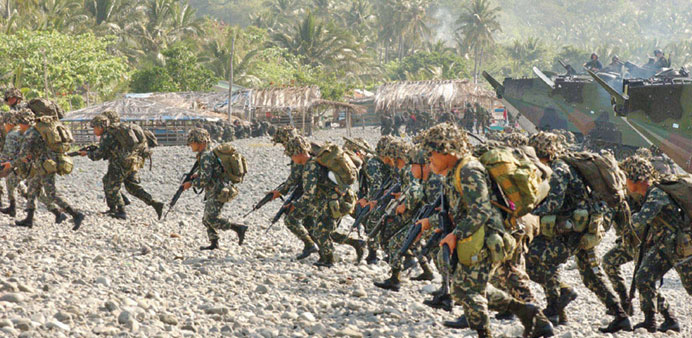By Joel M Sy Egco & Fernan Marasigan/Manila Times
Against a backdrop of China’s frenzied reclamation projects in the West Philippine Sea (South China Sea), the Philippines and the US begin today this year’s Balikatan (shoulder-to-shoulder) military exercises that Malacanang has said will boost both countries’ readiness to respond to threats in the region.
In an interview over government-owned Radyo ng Bayan yesterday, Presidential Communications Secretary Herminio Coloma Jr said while the war games are not directly aimed against China, these are meant to maintain a high level of preparedness for any contingency.
Balikatan 2015 is twice as big as last year’s and involves non-military activities such as construction of school buildings and roadways in places where the war games will be held.
“The militaries of both countries continue to co-ordinate to ensure a high level of preparedness for peace and stability in the region. This readiness to respond to any crisis or calamity is one of the aspects of this co-operation,” Coloma said.
The 10-day drills, he added, will ensure vigilance against any crisis or calamity that may endanger the people.
This year’s war games involve 6,656 US soldiers, 5,023 personnel of the Armed Forces of the Philippines (AFP) and 61 soldiers from the Australian Defence Forces (ADF). At least 91 aircraft will be used.
Some of the military exercises will be held on the central island of Palawan, which is near disputed territories in the West Philippine Sea.
Lt Col Harold Cabunoc, chief of the AFP Public Affairs Office, refused to discuss why the maritime activities will be held close to a maritime flashpoint. But he said part of it was the AFP’s preparation to defend the country from “any external armed aggression.”
He emphasised though that the increase in the number of participants has nothing to do with China’s sabre-rattling.
The doubling of the size of the annual war games, according to Cabunoc, is an indication that the commitment of both countries to help each other has levelled up.
“The co-operation between the two countries, among the participants, aims to improve capabilities in military-to-military engagements and non-military activities, and those include training. For example, we have lined up at least 16 activities in various places,” he said.
To coincide with the Balikatan opening, according to Cabunoc, AFP chief Gregorio Pio Catapang Jr will be presenting photos of structures constructed by China in the contested waterway.
“We will show to the world that these (China’s sea reclamations are) not just a concern of Filipinos but of everyone who uses the sea lanes because we don’t really know what step China will take once they have taken these islets and reefs,” he pointed out.
The AFP, Cabunoc said, seeks to widen awareness on implications of Chinese incursions that may cause military confrontation.

File photo of a Balikatan military exercise.
